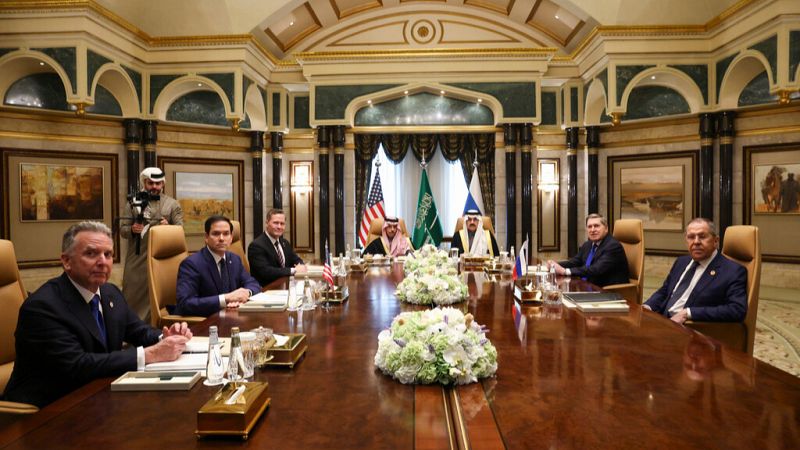US and Russia to 'normalise' relationship and start Ukraine talks, officials say

US and Russian officials, who met for high-stakes talks in Saudi Arabia on Tuesday, agreed to "normalise" relations between the two countries and begin discussions on the war in Ukraine, the US State Department said.
US State Secretary Marco Rubio called the meeting "the first step of a long and difficult journey."
He added that concessions should be made on both sides but that it would be wrong to "predetermine those".
US National Security Adviser Michael Waltz said that discussion of territory and security guarantees would "underlie" any type of talks moving forward and insisted there should be an "end" to Russia's war in Ukraine.
Both Rubio and Waltz pushed back on suggestions that European officials would be left out of negotiations, with Rubio concluding that the EU would be involved as it had "sanctions (against Russia) that have been imposed."
Waltz, for his part, said that the US allies were being consulted "literally almost on a daily basis, and we’ll continue to do so.”
Both sides also briefly discussed a potential meeting between US President Donald Trump and Russian President Vladimir Putin, although Putin's aide Yuri Ushakov added that such a meeting would be unlikely next week.
Overall, discussions were "not bad", according to Ushakov. "It is still difficult to say that (the positions of Russia and the United States) are converging, but there was talk about it," he said after the meeting.
Ushakov was present in the meeting alongside Waltz, Rubio, Russian Foreign Minister Sergey Lavrov and US special envoy Steve Witkoff.
'No agreement about us without us'
The meeting in the Saudi Arabian capital Riyadh was the first in-person discussion between top officials from both countries since the Kremlin launched its full-scale invasion of Ukraine almost three years ago.
The meeting comes as Trump upended years of foreign policy towards Russia by holding a phone call with Putin last Wednesday and declaring that both had agreed to start negotiations immediately.
A whirlwind week of speeches by US officials followed, in which it emerged that the Washington was seemingly uninterested in Ukraine's core demands for peace — including its long-held NATO ambitions — and that European leaders would not immediately have a seat at the negotiating table.
Ukrainian President Volodymyr Zelenskyy said on Monday that Kyiv would not recognise any peace agreement made without its participation.
"We cannot recognise … any agreements about us without us,” Zelenskyy said, adding that Ukraine was not made aware of the talks in Riyadh.
Kremlin's spokesperson Dmitry Peskov said that the meeting would be devoted to the "preparation of possible negotiations on the Ukrainian settlement and the organisation of a meeting between the two presidents."
On Monday, Lavrov said Moscow would hear out its US colleagues in comments cited by the state-run Tass news agency but added that Europe had "no place at the negotiating table."
He also said Russia had no intention of making territorial concessions to Ukraine during the peace talks, a likely sticking point between Putin and Zelenskyy.
Kyiv has insisted that any peace deal would include the full withdrawal of Russian troops from areas Moscow has seized during the invasion, as well as the Black Sea peninsula of Crimea — which Moscow annexed in 2014 — and the regions of Donetsk and Luhansk.
Ahead of the talks, Kirill Dmitriev, the head of the Russian Direct Investment Fund, who the Kremlin said might also join the meeting, said, "Good US-Russia relations are very important for the whole world. Only jointly can Russia and the US address lots of world problems, resolve global conflicts and offer solutions."
Zelenskyy said he would also be travelling to Saudi Arabia in a video briefing on Monday, although he stressed that his visit was not linked to Russia-US peace talks.
Keith Kellogg, Trump's special envoy to Ukraine, is also set to visit Zelenskyy in Kyiv on Thursday.
In response to fast-moving negotiations that seemed to be taking place without Europe, French President Emmanuel Macron convened an emergency meeting in Paris on Monday with other European leaders.
After the meeting, they vowed to continue supporting Ukraine but failed to provide concrete security guarantees, including a potential idea to send peacekeeping troops to Ukrainian territory.
Today

